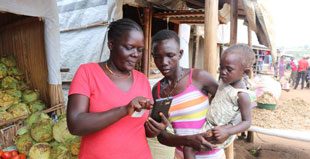
The Promise of Africa’s Bio-economy
GUEST COLUMN | OUSMANE BADIANE & JOACHIM VON BRAUN – ALL AFRICA.COM | Africa feels the impacts of COVID-19, conflict, and climate change perhaps more than any other region in the world. The costs of food, fuel, and fertilizer have skyrocketed over the past several months, adding to the slowdown in economic growth that the pandemic instigated.
But Africa’s answer to addressing this set of challenges in the future include new approaches: the continent’s vast and diverse plant resources, which in combination of advanced science and knowledge can be cultivated and processed as part of its “bioeconomy”. Unlocking the potential of the bioeconomy could help drive the next phase of Africa’s economic development all while better conserving the environment and tackling climate change, as a new report by the Malabo Montpellier Panel explains. Bioeconomy strategies emerged in many countries around the world during the past decade. Africa’s bioeconomy strategies shall be adapted to local and subregional contexts. While the science and knowledge base of bioeconomy is general and benefits from cooperation across countries, local context matters and will drive a uniquely African bioeconomy.
These resources are inherently renewable and economical, yet are often overlooked, underutilized or, even worse, wasted. Several African countries are now embracing the potential of a bioeconomy with rippling effects across their food and agriculture, health, energy, and industrial sectors.
Firstly, Africa is immensely rich both in the quantity and diversity of biomass. Many indigenous African plant species are highly nutritious or offer other health or medicinal benefits. Making use of these species can create livelihoods and incomes, especially in Africa’s rural areas but also for entrepreneurs and young people.
Monkey orange, for instance, is widely available in southern Africa, and is rich in vitamin C, zinc, and iron. By processing it, it can be made available even out of season to improve diets while also creating jobs. Meanwhile, lake flies, which abound in the Lake Victoria region in East Africa, are highly nutritious and are being caught in season and processed into less perishable products like lake fly-based crackers, muffins, meat loafs, and sausages.
The list of possibilities seems endless and includes not only food products, but also resources for medicines, cosmetics, and biofertilizer. Some examples include baobab, marula, wild cucumber, Kalahari desert truffle, Devil’s Claw, Faidherbia “fertilizer trees”, and the Lippia javanica plant whose oil acts as a natural mosquito repellent.
Likewise, Africa’s agricultural processing waste is being used in novel ways. These by-products – typically the leftover pith, husks, stems, leaves, and so on from commodity crops like sugarcane, coffee, and cotton, can be turned productive, including as bio-energy sources to replace fossil fuel and even for packaging. This reduces overall carbon emissions as food waste is a major greenhouse gas emitter.
Here again, there are plentiful examples to highlight. A South African company, for example, is using sugarcane pith to grow mushrooms rather than peat. A project in Uganda is converting livestock waste into biogas, helping the abattoir save 90 percent in energy costs, and avoiding water pollution going into nearby Lake Victoria. Elsewhere, the paper-like pseudostem from bananas is being used instead of plastic as biodegradable packaging for cushioning soft fruits and vegetables during transport.
Innovation is also being supported across the African continent to improve the performance and benefits of natural products. This includes agricultural biotechnology to develop new breeds that are pest and disease resistant, and heat and drought tolerant; biochemical research to help stave off disease; and even new commercially viable processes for converting various by-products into value-added goods such as biodegradable bags, sanitary pads, textiles, briquettes, food and beverages, enriched animal feed, and so on.
South Africa is a global leader in this regard, having already recognized the potential of capitalizing on its natural wealth. Not only is it one of the most biologically diverse countries in the world, but it is also currently one of only 15 countries in the world – and the only one in Africa – to have approved a dedicated and comprehensive bioeconomy strategy.
Over the last two decades, South Africa’s policymakers have developed a portfolio of policies, strategies, and supporting institutions to develop a thriving bioeconomy, investing in education, improving collaboration between universities and industry, strengthening its intellectual property environment, and supporting small businesses. Policy adjustments in parallel have ensured that the process is rooted in a clear vision and focused on key sectors with the most promise like agriculture, health, and industrial goods. Between 2007 and 2020, the bioeconomy’s contribution to South Africa’s GDP remained relatively consistent at about eight percent and generated between 14 and 16 million jobs.
Other countries are also on the path of developing their bioeconomies in similar ways. Namibia is working with the UN to develop its first bioeconomy strategy. Uganda too is in the process of finalizing its national bioeconomy strategy while its National Agricultural Research Organization and universities have become a hub of excellence on agricultural R&D, and various incubators are providing a valuable launchpad for bio-enterprise entrepreneurs. Ghana has transformed its cocoa sector with biosciences and technology and established a wide range of industries for cashew, shea, and their by-products.
Across the continent, African governments have the potential to transform their economies in similar ways, simultaneously kickstarting new channels for sustainable economic development while becoming less reliant on global supply chains.
******
***
Dr. Ousmane Badiane is the Executive Chairperson of AKADEMIYA2063 and Co-Chair, Malabo Montpellier Panel
Prof. Joachim von Braun, is the Distinguished Professor, University of Bonn, Co-Chair, Malabo Montpellier Panel, and member of the International Advisory Group on Global Bioeconomy
 The Independent Uganda: You get the Truth we Pay the Price
The Independent Uganda: You get the Truth we Pay the Price



